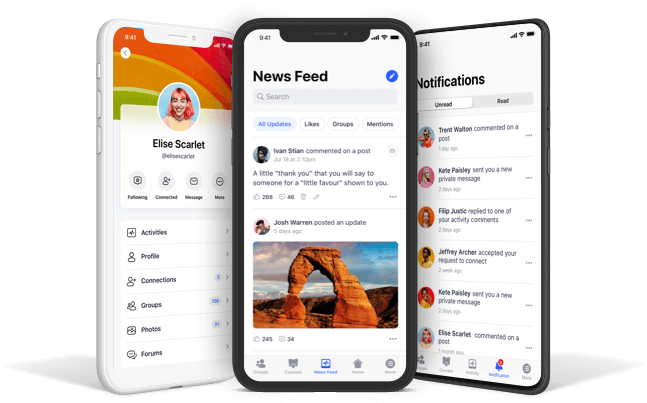Companies and institutions across various business sectors are transitioning to eLearning as a means of developing their employees – especially as they recognize eLearning’s ability to help them achieve their training needs.
Here are five industries that are embracing eLearning and how they’re reaping the benefits:
Education
Considering that the education sector is in the business of helping people learn and develop, it’s little wonder that they’re embracing eLearning so wholeheartedly. It’s an industry that has always been willing to adopt technological advances, like distance and televised learning, for any possible advantage in being more effective.
The development and growth of the internet gave educators the ability to widely distribute learning materials in various formats such as PDFs, slideshows, audio, and video. It’s also freed students from the restriction of having to be in a certain place at a particular time; giving them instead, the means to access information anywhere at any time and in a form most suitable to them.
Today, with ever-increasing internet bandwidth and ubiquitous smartphone, laptops, and mobile phone adoption, it’s easier than ever for educators to create and deliver course content anywhere in the world. An example of this is the explosion in the demand for online English teachers and tutors in Asia, particularly China. Using Skype or a tailor-made LMS, it’s relatively simple for an educational institution to pair a competent instructor with a willing student regardless of where either is located.
Manufacturing
The fast-paced manufacturing industry is forced to deal with constant and rapid change, and with constant shifts in demand and work priorities, training and development can often be overlooked. However, with frequent developments in technology and infrastructure, as well as high staff turnover, there’s a strong need to get employees up to speed – and quickly.
eLearning has given this industry the ability to deliver training while sticking to tight deadlines and production schedules. eLearning content makes employee orientation easier for companies, allows them to take on larger numbers of workers at a time, and makes them competent and comfortable in their new working environments, as quickly as possible. This is especially helpful in the manufacturing industry that often experiences seasonal surges in demand that call for an immediate increase in recruitment.
Manufacturing companies have also benefited from the blended learning approach that eLearning makes possible. A great deal of work in such an environment like a factory is hands-on and as a result, demands the same approach when training new employees. However, the more theoretical parts of the training can be extracted, placed into another medium (like video), and completed by the employee at a time most convenient to the needs of the business.
Healthcare
In the healthcare industry, keeping up to date with the latest trends and developments isn’t merely a desirable choice – it is mandatory. Unfortunately, the people that work in healthcare are often the most pressed for time and have the most erratic schedules, making it difficult for them to be properly trained in a timely fashion.
eLearning tools have equipped the healthcare sector with the flexibility needed to provide personnel with the right training and development. mLearning applications allow doctors, nurses, pharmacists, and other healthcare professionals to study wherever they are, preventing the need to travel to a particular place to attend training. Many of these professionals’ working days are such that they could be called on to attend to an emergency and pulled away from whatever else they were doing – including training. This makes the ability to suspend their training at any time before returning to it later highly desirable and incredibly helpful.
The healthcare industry is also subject to new and ever-changing compliance to which those who work within it have to adhere – with steep consequences for failure. eLearning tools provide an efficient way for companies, hospitals, and other institutions to ensure their employees are up to date. Delivering such training through an LMS, for example, allows employers to easily track the progress of their employees and prove such training was undertaken if the need ever arose.
Retail
The retail sector is a particularly dynamic one, as it strongly influenced by the constant change in fashion and consumer preferences. This change is even built into the industry in a way, with most retailers being required to refresh their inventory and marketing efforts every season. To remain competitive, companies have to learn as much as they can about emerging trends and ensure their employees are armed with as much information as possible.
eLearning tools have provided the means for the retail industry to deal with their regular intake of new information. Online training tools allow for more training to be conducted in-house, allowing it to take place more frequently and at a faster rate. Such tools also allow for easy updates to training materials, so they can add any new, relevant information gathered by employees when dealing with new products as well as their customers’ responses to them. This allows for more mid-course correction and enables retailers to better learn from their mistakes and satisfy the ever-changing needs of the marketplace.
Also, like the manufacturing sector, the retail sector is subject to high staff turnover and seasonal demand for increased recruitment. Conducting their employee orientation with eLearning tools allows businesses to carry this out with increased efficiency and at a lower cost. What’s more, eLearning provides a means to satisfy the development and training needs of staff on a more regular basis than might have been possible through traditional training methods. By investing more in their future, the staff are likely to feel more valued, resulting in higher employee retention.
Finance
The financial industry is one that lives and dies by up-to-date information. This includes the quality ofthat information and how quickly and effectively it’s acted upon. Millions, if not billions, of dollars can be made or lost depending on the decisions a company makes regarding how uses the information at its disposal. Recognizing this, financial institutions are wisely turning to eLearning methods to help them process information.
A lot of this information is concerned with compliance, like the manufacturing and healthcare industries. The financial industry is heavily steeped in regulations and procedure. Not only does an employee of a financial institution have to familiarize themselves with their company’s internal guidelines, but with the regional, national, and possibly international regulations of the industry as a whole. Failure to do so could cost their employers a lot of money – which is never going to go down well.
eLearning tools, such as online courses, allow for the efficient onboarding of employees to ensure they’re well versed in the appropriate legislation, as well as the continuing education of employees whenever it’s required. The information within such courses can be easily amended to reflect changes in regulation. This grants companies the freedom to educate their employees only on relevant changes within the industry instead of sending them on another entire training course to get up to date. This is why the financial sector responds so well to the “as-needed” or “choose your own adventure” opportunities that characterize eLearning and mLearning.
The flexibility that eLearning provides is another factor that’s particularly attractive to the industry. The financial industry is known for both its long working hours and fast-paced working environment, so traditional, classroom-based training is often disruptive. mLearning tools allow employees to learn in their own time: between periods of hectic activity in the office or during a commute.
Check out another article on tailoring your courses for the surging Millennial workforce right here.









